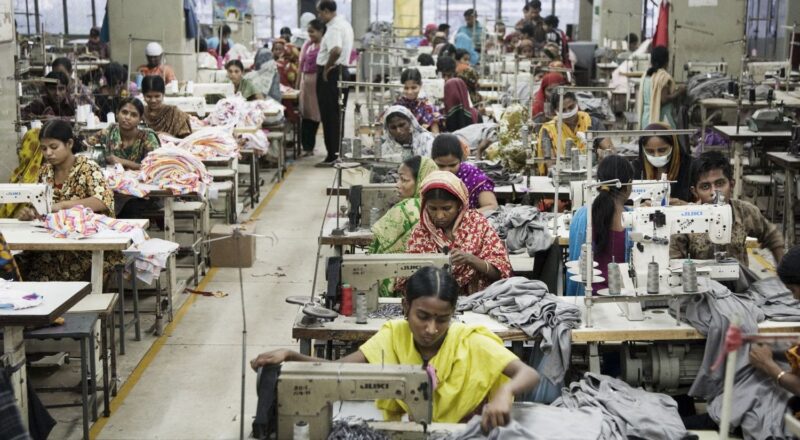Cover photo : Garment sweatshop in Bangladesh with the workload of the women workers. Photo credit : Adam Smith Institude (2019).
Volume 1, Number 1, November 2022 | Essay
Globalization has opened the barriers between countries and allows the flow of goods, services, and capital. Multinational corporations have become more powerful in managing the flow of capital between countries. The common business model for those companies is to produce at a low cost and sell at a low price. They could reduce their production costs in many ways and one of those is to hire labor from developing countries, mostly in Asia and Africa, where wages are substantially cheaper. At the same time, the developing nations tried to develop themselves under globalization. They sought capital inflow from foreign investment and were successful as they could match the need for cheap labor from multinational corporations. When trying to attract foreign direct investment, countries should not be proud of their cheap labor because it violates human rights, enhances poverty and inequality, and is an admission that their development model fails to raise living standards for their people.
Human rights violation is a major concern that spreads everywhere in the time of globalization. Because reducing the wage rate is the key strategy of multinational firms to cut their costs, most laborers in developing countries are forced to work under horrific working conditions. For example, the workers must work overtime from early in the morning to late at night without any break and there is evidence of physical and verbal abuse in the factories (Robertson et al., 2016). Although the international worker rights standard has been promoted, most of the developing countries still fail to meet the international criteria as they need to accommodate foreign direct investment. Moreover, cheap labor in developing countries could also be considered a form of modern-day slavery as they are exploited, forced to work, and treated as slaves. According to Anti-slavery International, most people get into the cycle of modern-day slavery with the hope to escape from poverty and achieve a higher quality of life. Some of them, mostly women and children, have no other choice but to be slaves. Furthermore, child labor not only violates human rights but also leads to many problems in the longer term, including a lack of education and ethics. In other words, when children do not get an adequate education, they would later cause many problems to society such as committing different types of crime.
The most common sector multinational enterprises expand their production to developing countries is the garment industry, in which the production sites are usually sweatshops. The as fast fashion industry has been growing rapidly to meet the rising global consumer demand, multinational companies expand their production to cheap labor countries. One example that illustrates the mass impact of the multinational garment industry on cheap labor is the Rana Plaza accident in 2013. The Rana Plaza in Dhaka, Bangladesh collapsed which injured over 2,500 workers and killing approximately 1,132 workers (ILO, 2017). In addition, the hazardous working environment led to several accidents that caused injuries and death. Because the multinational garment companies and local sweatshop owners in Bangladesh wanted to cut the production cost as much as they could, the construction of factories and the quality of equipment and machinery are usually unsafe. In addition, the victims of the Rana Plaza collapse and other accidents, and their families received very low compensation which they should get to compensate for their income loss (ILO, 2017). This means that multinational employers were not responsible for their faults and there is no humanity to force humans to work in danger under the condition of cheap labor.
Another important question to ask is that does cheap labor make developing countries richer. Even though multinational firms bring a large amount of capital to those countries, income distribution is still a significant problem. While the elites benefit from economic integration, the lower-class people do not seem to have any changes in their income (Schoder, 2018). Globalization intensifies the difference between low-skilled labor in developing countries and high-skilled labor in developed countries. With the power of multinational companies, low-skilled jobs are put for developing countries’ labor to do. Therefore, the wage standard in those countries cannot be raised as they have to serve the labor demand from foreigners. On one hand, the poor who are forced to work in the factories and paid below a living wage, become poorer. The elites, on the other hand, get the advantages of foreign direct investment (Dadush & Shaw, 2012). This means that poverty, which is an existing problem that is difficult to solve and is a burden for economic development in most developing countries, is concentrated.
It is true that cheap labor is a pattern of economic development in most developing countries. However, it should then be asked what is the goal of development and do those countries achieve their goal. If a country set the goal just to become richer in terms of economic growth, it might be successful because opening for multinational companies investment under low wage standards brings very high income into the country. This contradicts the actual concept of development as the country should also consider the people’s well-being. For example, the measurement of living standards like health, education, and security should be improved through the development path. However, living conditions become even worse after globalization. As a result of low wage paid, workers have to live under poor conditions. Some of them face starvation, some of them face diseases, and some of them face dehumanization. The situation will become even worse if the countries still set their wage standard at a very low level such that there is more willingness to invest by multinational enterprises. If it goes this way, cheap labor may represent the failure of development in emerging countries.
In conclusion, although it can be argued that cheap labor is beneficial for developing countries by boosting economic growth as can be seen by the miracle of China and India. Some people agreed that when countries have higher incomes, they can improve the living conditions of their people. However, this essay illustrates another view of cheap labor. Firstly, cheap labor comes with human rights violations. Most of the workers in developing countries, including women and children are treated as modern-day slaves. Secondly, cheap labor intensifies the problematic inequality and poverty issues in developing countries. Lastly, cheap labor highlights the failure of development in developing countries because if they are successful, they should be able to raise the wage standards. Therefore, countries should not be proud of their cheap labor.
References
Beaubien, J. (2016, December 7). Study: Child laborers in Bangladesh are working 64 hours a week. NPR. Retrieved from https://www.npr.org/sections/goatsandsoda/2016/12/07/504681046/study-child-laborers-in-bangladesh-are-working-64-hours-a-week
Child labour in Asia and the Pacific (IPEC). (n.d.). Retrieved from https://www.ilo.org/ipec/Regionsandcountries/Asia/lang–en/index.htm
Dadush, U., & Shaw, W. (2012, February 2). Globalization, labor markets, and inequality. Carnegie Endowment for International Peace. Retrieved from https://carnegieendowment.org/2012/02/02/globalization-labor-markets-and-inequality-pub-47028
Rahman, S. & Yadlapalli, A (2022, August 4). Years after the Rana Plaza Tragedy, Bangladesh’s garment workers are still bottom of the pile. The Conversation. Retrieved from https://theconversation.com/years-after-the-rana-plaza-tragedy-bangladeshs-garment-workers-are-still-bottom-of-the-pile-159224
Robertson, R. et al. (2016, September) Working conditions, work outcomes, and policy in Asian developing countries. (n.d.). Retrieved from https://www.adb.org/sites/default/files/publication/198551/ewp-497.pdf
Schoder, D. (2018, June 15). Is a globalized world a less equal world? American Economic Association. (n.d.). Retrieved from https://www.aeaweb.org/research/globalization-income-inequality-trade-policy
The Rana Plaza Accident and its aftermath. (2017, December 21). Retrieved from https://www.ilo.org/global/topics/geip/WCMS_614394/lang–en/index.htm
Yoshikane, A. (2009, October 14). Change of heart at WTO? globalization doesn’t help poor workers, report says. In These Times. Retrieved from https://inthesetimes.com/article/globalization-doesnt-help-workers-in-developing-world-report












































I definitely agree that many people have over praise the cheap labor and the factor that you present is also very good from my perspective. The topic of cheap labor relate to the violation of human rights is something that we cannot ignore, which is why I think it is very good that you mention it. I think that many people still saw that cheap labor will bring opportunity to the country, but according to the information in your essay, the labor force did not receive the quality of life that humans should have, which is a very important argument in this essay. The income that they receive also did not higher due to the policy of cheap labor, which also increases inequality in society. The combination of the information that the author gives has led to underdevelopment, which is a failure from what many upper-class methods of “cheap labor”.
I strongly agree with your argument that countries should not be proud of cheap labor. I think you have provided solid evidence on the impact of the multinational garment industry on cheap labour to strengthen the points. The Rana Plaza accident has shown that corporations strive to reduce costs by avoiding improving the quality of machinery, which leads to a dangerous working environment. Another point that has extended my viewpoint is your argument that cheap labour highlights the failure of development in developing countries. This has helped me understand why wages in developing countries cannot be raised and the subsequent consequence to development. Furthermore, you made a brilliant evaluation about the goal of development. Setting a goal of high-income economic growth under low wage standards may impede people’s well-being, which contradicts the concept of development.
I am totally on your side on the take that cheap labor is not something to be proud of. As a matter of fact, I think that it shows how the country failed as a whole to uplift its citizens’ standard of living and basic needs. Some might think that cheap labor can produce more jobs and is beneficial toward the host country but I think that they are just being extracted of their labor and basic human rights. Lastly, cheap labor also means that the supply of skilled labor is lower than other countries and the technological progress is also worst than those higher wage countries. After all, I think that you really see through the line and come up with a really detailed point and supports that could be used to informed others on the topic.